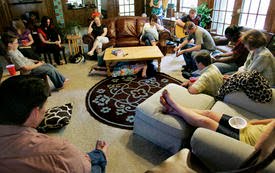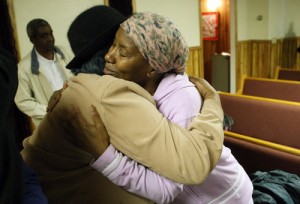
When it comes to keeping a statistical finger on evangelical Christianity, the Barna Group really has no peers. So, when George Barna and Co. tells you that church attendance is down nationwide, well, it is.
In a survey released earlier this month, Barna found that church attendance among women – long the more faithful of the genders – has dipped 11 percent since 1991 to where today 42 percent of them attend religious services. Men, meanwhile, dropped six points to just 36 percent.
Oddly enough, Barna also found that the percentage of men and women who qualify themselves as “born again” Christians – defined by researchers as believing “they will experience eternal salvation based on their commitment to Jesus Christ, personal confession of sins, and acceptance of Christ as their savior” – rose five points between 1991 and today.
Nationally, 40 percent of Americans claim the “born again” label (other studies show 76 percent of Americans consider themselves more generic Christians, at least nominally).
So, if this segment of Christianity, i.e. the “born again” and/or evangelical wing, is showing growth, why aren’t they going to church? The answer to that question depends on what you mean by “church.”

A growing number of Christians are turning away from large congregations and traditional church buildings toward the growing “house church movement,” preferring smaller, more intimate gatherings of believers. Barna also looked at that trend recently, and found when survey respondents were asked if they had “attended a worship service in someone’s home, known as a house church,” 10 percent said they had done so within the past month. Make that time period a year long and the affirmative answer jumped to 13 percent.
Other believers are choosing to “attend” online churches, whether they consist of video streams of live services in actually brick-and-mortar churches, or are solely based in cyberspace. Worship, music, even tithing and offerings can be done online; fellowship occurs with live chats or discussion forums and email. (Imagine the savings on hand sanitizers . . .)
I guess I’m old fashioned. I like the idea that people are at least participating, albeit in a way that misses the spirituality of congregational (i.e. actually living, breathing human beings elbow to elbow, handshakes and hugs) worship. Attend church from you keyboard, tablet PC or smartphone? Good for you . . . but try human contact, too. Sure, it has its risks – but it is more, what, real?
I’m less perplexed by the house church idea. In fact, I kind of like it. After all, this is how Christians of the First Century – and millions today in China and many Muslim countries where professing Christian faith is physically dangerous – met and shared community.

The point is, to be Christian is to be part of a body of believers. It’s not all there is to being a Christian, or “Christ-like,” of course. But gathering regularly is an expression of love for God, and for those we claim as brothers and sisters; meeting together can reaffirm commitment to faith and each other; and corporate worship can be powerful, like the old hymn Blest Be The Tie That Binds Remember this? “Blest be the tie that binds, Our hearts in Christian love; The fellowship of kindred minds Is like to that above. . . .”).
And attending/fellowshiping complies with the scriptural admonition: ”And let us not neglect our meeting together, as some people do, but encourage one another, especially now that the day of his return is drawing near.” (Hebrews 10:25 New Living Translation).
So, there’s that. And if you take this whole Christian thing seriously, well, fellowship just doesn’t seem an option. Not going to church – however you define it – won’t see you roasting in hell, as it were, but avoiding other believers (however obnoxious, how . . . human they are) seems a rather clear no-no.
As a preacher’s kid, I know very (very, very) well the temptation to just write off the sizeable bunch of self-righteous, fiber-deprived, church-going Christians whose hypocrisy can turn your spiritual (and sometimes physical) belly.
Indeed, my Dad, the preacher, often would despair of the downright ornery-ness of his flock, musing that if, as believers, we were all a part of the Body of Christ, then ministers must be at the end where the church’s spiritual intestines emptied.
But, after saying that, he’d sigh, smile and add: “Bobby, don’t look at people in church. A lot of them are just plain nuts. Keep your eyes on Jesus.”
Yep. We all need a savior. I mean, we really, really do.

